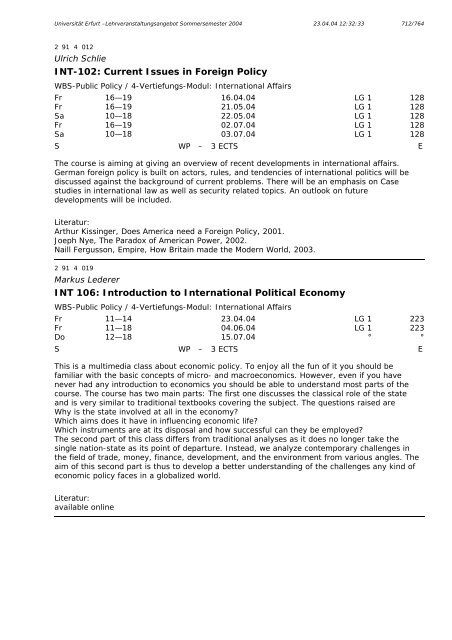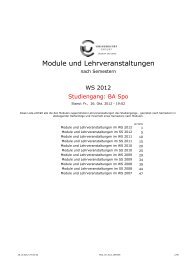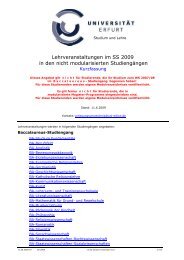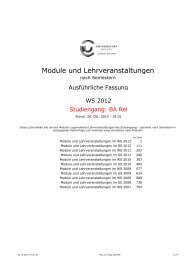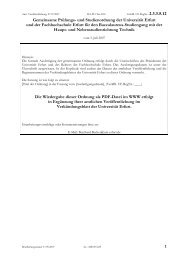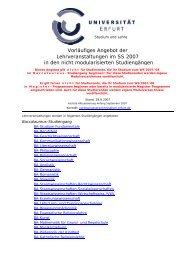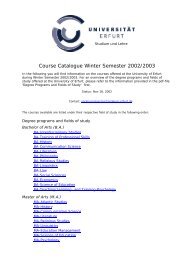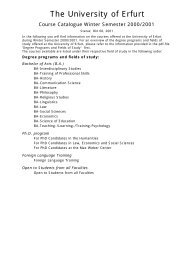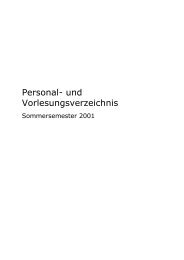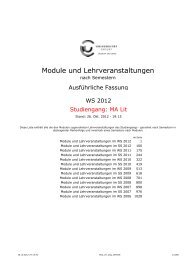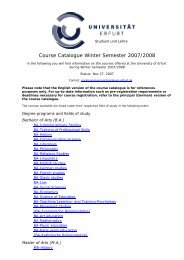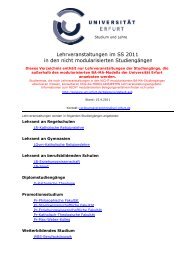- Seite 1 und 2:
Studium und Lehre Lehrveranstaltung
- Seite 3 und 4:
Lehramt an berufsbildenden Schulen
- Seite 5 und 6:
Universität Erfurt -Lehrveranstalt
- Seite 7 und 8:
Universität Erfurt -Lehrveranstalt
- Seite 9 und 10:
Universität Erfurt -Lehrveranstalt
- Seite 11 und 12:
Universität Erfurt -Lehrveranstalt
- Seite 13 und 14:
Universität Erfurt -Lehrveranstalt
- Seite 15 und 16:
Universität Erfurt -Lehrveranstalt
- Seite 17 und 18:
Universität Erfurt -Lehrveranstalt
- Seite 19 und 20:
Universität Erfurt -Lehrveranstalt
- Seite 21 und 22:
Universität Erfurt -Lehrveranstalt
- Seite 23 und 24:
Universität Erfurt -Lehrveranstalt
- Seite 25 und 26:
Universität Erfurt -Lehrveranstalt
- Seite 27 und 28:
Universität Erfurt -Lehrveranstalt
- Seite 29 und 30:
Universität Erfurt -Lehrveranstalt
- Seite 31 und 32:
Universität Erfurt -Lehrveranstalt
- Seite 33 und 34:
Universität Erfurt -Lehrveranstalt
- Seite 35 und 36:
Universität Erfurt -Lehrveranstalt
- Seite 37 und 38:
Universität Erfurt -Lehrveranstalt
- Seite 39 und 40:
Universität Erfurt -Lehrveranstalt
- Seite 41 und 42:
Universität Erfurt -Lehrveranstalt
- Seite 43 und 44:
Universität Erfurt -Lehrveranstalt
- Seite 45 und 46:
Universität Erfurt -Lehrveranstalt
- Seite 47 und 48:
Universität Erfurt -Lehrveranstalt
- Seite 49 und 50:
Universität Erfurt -Lehrveranstalt
- Seite 51 und 52:
Universität Erfurt -Lehrveranstalt
- Seite 53 und 54:
Universität Erfurt -Lehrveranstalt
- Seite 55 und 56:
Universität Erfurt -Lehrveranstalt
- Seite 57 und 58:
Universität Erfurt -Lehrveranstalt
- Seite 59 und 60:
Universität Erfurt -Lehrveranstalt
- Seite 61 und 62:
Universität Erfurt -Lehrveranstalt
- Seite 63 und 64:
Universität Erfurt -Lehrveranstalt
- Seite 65 und 66:
Universität Erfurt -Lehrveranstalt
- Seite 67 und 68:
Universität Erfurt -Lehrveranstalt
- Seite 69 und 70:
Universität Erfurt -Lehrveranstalt
- Seite 71 und 72:
Universität Erfurt -Lehrveranstalt
- Seite 73 und 74:
Universität Erfurt -Lehrveranstalt
- Seite 75 und 76:
Universität Erfurt -Lehrveranstalt
- Seite 77 und 78:
Universität Erfurt -Lehrveranstalt
- Seite 79 und 80:
Universität Erfurt -Lehrveranstalt
- Seite 81 und 82:
Universität Erfurt -Lehrveranstalt
- Seite 83 und 84:
Universität Erfurt -Lehrveranstalt
- Seite 85 und 86:
Universität Erfurt -Lehrveranstalt
- Seite 87 und 88:
Universität Erfurt -Lehrveranstalt
- Seite 89 und 90:
Universität Erfurt -Lehrveranstalt
- Seite 91 und 92:
Universität Erfurt -Lehrveranstalt
- Seite 93 und 94:
Universität Erfurt -Lehrveranstalt
- Seite 95 und 96:
Universität Erfurt -Lehrveranstalt
- Seite 97 und 98:
Universität Erfurt -Lehrveranstalt
- Seite 99 und 100:
Universität Erfurt -Lehrveranstalt
- Seite 101 und 102:
Universität Erfurt -Lehrveranstalt
- Seite 103 und 104:
Universität Erfurt -Lehrveranstalt
- Seite 105 und 106:
Universität Erfurt -Lehrveranstalt
- Seite 107 und 108:
Universität Erfurt -Lehrveranstalt
- Seite 109 und 110:
Universität Erfurt -Lehrveranstalt
- Seite 111 und 112:
Universität Erfurt -Lehrveranstalt
- Seite 113 und 114:
Universität Erfurt -Lehrveranstalt
- Seite 115 und 116:
Universität Erfurt -Lehrveranstalt
- Seite 117 und 118:
Universität Erfurt -Lehrveranstalt
- Seite 119 und 120:
Universität Erfurt -Lehrveranstalt
- Seite 121 und 122:
Universität Erfurt -Lehrveranstalt
- Seite 123 und 124:
Universität Erfurt -Lehrveranstalt
- Seite 125 und 126:
Universität Erfurt -Lehrveranstalt
- Seite 127 und 128:
Universität Erfurt -Lehrveranstalt
- Seite 129 und 130:
Universität Erfurt -Lehrveranstalt
- Seite 131 und 132:
Universität Erfurt -Lehrveranstalt
- Seite 133 und 134:
Universität Erfurt -Lehrveranstalt
- Seite 135 und 136:
Universität Erfurt -Lehrveranstalt
- Seite 137 und 138:
Universität Erfurt -Lehrveranstalt
- Seite 139 und 140:
Universität Erfurt -Lehrveranstalt
- Seite 141 und 142:
Universität Erfurt -Lehrveranstalt
- Seite 143 und 144:
Universität Erfurt -Lehrveranstalt
- Seite 145 und 146:
Universität Erfurt -Lehrveranstalt
- Seite 147 und 148:
Universität Erfurt -Lehrveranstalt
- Seite 149 und 150:
Universität Erfurt -Lehrveranstalt
- Seite 151 und 152:
Universität Erfurt -Lehrveranstalt
- Seite 153 und 154:
Universität Erfurt -Lehrveranstalt
- Seite 155 und 156:
Universität Erfurt -Lehrveranstalt
- Seite 157 und 158:
Universität Erfurt -Lehrveranstalt
- Seite 159 und 160:
Universität Erfurt -Lehrveranstalt
- Seite 161 und 162:
Universität Erfurt -Lehrveranstalt
- Seite 163 und 164:
Universität Erfurt -Lehrveranstalt
- Seite 165 und 166:
Universität Erfurt -Lehrveranstalt
- Seite 167 und 168:
Universität Erfurt -Lehrveranstalt
- Seite 169 und 170:
Universität Erfurt -Lehrveranstalt
- Seite 171 und 172:
Universität Erfurt -Lehrveranstalt
- Seite 173 und 174:
Universität Erfurt -Lehrveranstalt
- Seite 175 und 176:
Universität Erfurt -Lehrveranstalt
- Seite 177 und 178:
Universität Erfurt -Lehrveranstalt
- Seite 179 und 180:
Universität Erfurt -Lehrveranstalt
- Seite 181 und 182:
Universität Erfurt -Lehrveranstalt
- Seite 183 und 184:
Universität Erfurt -Lehrveranstalt
- Seite 185 und 186:
Universität Erfurt -Lehrveranstalt
- Seite 187 und 188:
Universität Erfurt -Lehrveranstalt
- Seite 189 und 190:
Universität Erfurt -Lehrveranstalt
- Seite 191 und 192:
Universität Erfurt -Lehrveranstalt
- Seite 193 und 194:
Universität Erfurt -Lehrveranstalt
- Seite 195 und 196:
Universität Erfurt -Lehrveranstalt
- Seite 197 und 198:
Universität Erfurt -Lehrveranstalt
- Seite 199 und 200:
Universität Erfurt -Lehrveranstalt
- Seite 201 und 202:
Universität Erfurt -Lehrveranstalt
- Seite 203 und 204:
Universität Erfurt -Lehrveranstalt
- Seite 205 und 206:
Universität Erfurt -Lehrveranstalt
- Seite 207 und 208:
Universität Erfurt -Lehrveranstalt
- Seite 209 und 210:
Universität Erfurt -Lehrveranstalt
- Seite 211 und 212:
Universität Erfurt -Lehrveranstalt
- Seite 213 und 214:
Universität Erfurt -Lehrveranstalt
- Seite 215 und 216:
Universität Erfurt -Lehrveranstalt
- Seite 217 und 218:
Universität Erfurt -Lehrveranstalt
- Seite 219 und 220:
Universität Erfurt -Lehrveranstalt
- Seite 221 und 222:
Universität Erfurt -Lehrveranstalt
- Seite 223 und 224:
Universität Erfurt -Lehrveranstalt
- Seite 225 und 226:
Universität Erfurt -Lehrveranstalt
- Seite 227 und 228:
Universität Erfurt -Lehrveranstalt
- Seite 229 und 230:
Universität Erfurt -Lehrveranstalt
- Seite 231 und 232:
Universität Erfurt -Lehrveranstalt
- Seite 233 und 234:
Universität Erfurt -Lehrveranstalt
- Seite 235 und 236:
Universität Erfurt -Lehrveranstalt
- Seite 237 und 238:
Universität Erfurt -Lehrveranstalt
- Seite 239 und 240:
Universität Erfurt -Lehrveranstalt
- Seite 241 und 242:
Universität Erfurt -Lehrveranstalt
- Seite 243 und 244:
Universität Erfurt -Lehrveranstalt
- Seite 245 und 246:
Universität Erfurt -Lehrveranstalt
- Seite 247 und 248:
Universität Erfurt -Lehrveranstalt
- Seite 249 und 250:
Universität Erfurt -Lehrveranstalt
- Seite 251 und 252:
Universität Erfurt -Lehrveranstalt
- Seite 253 und 254:
Universität Erfurt -Lehrveranstalt
- Seite 255 und 256:
Universität Erfurt -Lehrveranstalt
- Seite 257 und 258:
Universität Erfurt -Lehrveranstalt
- Seite 259 und 260:
Universität Erfurt -Lehrveranstalt
- Seite 261 und 262:
Universität Erfurt -Lehrveranstalt
- Seite 263 und 264:
Universität Erfurt -Lehrveranstalt
- Seite 265 und 266:
Universität Erfurt -Lehrveranstalt
- Seite 267 und 268:
Universität Erfurt -Lehrveranstalt
- Seite 269 und 270:
Universität Erfurt -Lehrveranstalt
- Seite 271 und 272:
Universität Erfurt -Lehrveranstalt
- Seite 273 und 274:
Universität Erfurt -Lehrveranstalt
- Seite 275 und 276:
Universität Erfurt -Lehrveranstalt
- Seite 277 und 278:
Universität Erfurt -Lehrveranstalt
- Seite 279 und 280:
Universität Erfurt -Lehrveranstalt
- Seite 281 und 282:
Universität Erfurt -Lehrveranstalt
- Seite 283 und 284:
Universität Erfurt -Lehrveranstalt
- Seite 285 und 286:
Universität Erfurt -Lehrveranstalt
- Seite 287 und 288:
Universität Erfurt -Lehrveranstalt
- Seite 289 und 290:
Universität Erfurt -Lehrveranstalt
- Seite 291 und 292:
Universität Erfurt -Lehrveranstalt
- Seite 293 und 294:
Universität Erfurt -Lehrveranstalt
- Seite 295 und 296:
Universität Erfurt -Lehrveranstalt
- Seite 297 und 298:
Universität Erfurt -Lehrveranstalt
- Seite 299 und 300:
Universität Erfurt -Lehrveranstalt
- Seite 301 und 302:
Universität Erfurt -Lehrveranstalt
- Seite 303 und 304:
Universität Erfurt -Lehrveranstalt
- Seite 305 und 306:
Universität Erfurt -Lehrveranstalt
- Seite 307 und 308:
Universität Erfurt -Lehrveranstalt
- Seite 309 und 310:
Universität Erfurt -Lehrveranstalt
- Seite 311 und 312:
Universität Erfurt -Lehrveranstalt
- Seite 313 und 314:
Universität Erfurt -Lehrveranstalt
- Seite 315 und 316:
Universität Erfurt -Lehrveranstalt
- Seite 317 und 318:
Universität Erfurt -Lehrveranstalt
- Seite 319 und 320:
Universität Erfurt -Lehrveranstalt
- Seite 321 und 322:
Universität Erfurt -Lehrveranstalt
- Seite 323 und 324:
Universität Erfurt -Lehrveranstalt
- Seite 325 und 326:
Universität Erfurt -Lehrveranstalt
- Seite 327 und 328:
Universität Erfurt -Lehrveranstalt
- Seite 329 und 330:
Universität Erfurt -Lehrveranstalt
- Seite 331 und 332:
Universität Erfurt -Lehrveranstalt
- Seite 333 und 334:
Universität Erfurt -Lehrveranstalt
- Seite 335 und 336:
Universität Erfurt -Lehrveranstalt
- Seite 337 und 338:
Universität Erfurt -Lehrveranstalt
- Seite 339 und 340:
Universität Erfurt -Lehrveranstalt
- Seite 341 und 342:
Universität Erfurt -Lehrveranstalt
- Seite 343 und 344:
Universität Erfurt -Lehrveranstalt
- Seite 345 und 346:
Universität Erfurt -Lehrveranstalt
- Seite 347 und 348:
Universität Erfurt -Lehrveranstalt
- Seite 349 und 350:
Universität Erfurt -Lehrveranstalt
- Seite 351 und 352:
Universität Erfurt -Lehrveranstalt
- Seite 353 und 354:
Universität Erfurt -Lehrveranstalt
- Seite 355 und 356:
Universität Erfurt -Lehrveranstalt
- Seite 357 und 358:
Universität Erfurt -Lehrveranstalt
- Seite 359 und 360:
Universität Erfurt -Lehrveranstalt
- Seite 361 und 362:
Universität Erfurt -Lehrveranstalt
- Seite 363 und 364:
Universität Erfurt -Lehrveranstalt
- Seite 365 und 366:
Universität Erfurt -Lehrveranstalt
- Seite 367 und 368:
Universität Erfurt -Lehrveranstalt
- Seite 369 und 370:
Universität Erfurt -Lehrveranstalt
- Seite 371 und 372:
Universität Erfurt -Lehrveranstalt
- Seite 373 und 374:
Universität Erfurt -Lehrveranstalt
- Seite 375 und 376:
Universität Erfurt -Lehrveranstalt
- Seite 377 und 378:
Universität Erfurt -Lehrveranstalt
- Seite 379 und 380:
Universität Erfurt -Lehrveranstalt
- Seite 381 und 382:
Universität Erfurt -Lehrveranstalt
- Seite 383 und 384:
Universität Erfurt -Lehrveranstalt
- Seite 385 und 386:
Universität Erfurt -Lehrveranstalt
- Seite 387 und 388:
Universität Erfurt -Lehrveranstalt
- Seite 389 und 390:
Universität Erfurt -Lehrveranstalt
- Seite 391 und 392:
Universität Erfurt -Lehrveranstalt
- Seite 393 und 394:
Universität Erfurt -Lehrveranstalt
- Seite 395 und 396:
Universität Erfurt -Lehrveranstalt
- Seite 397 und 398:
Universität Erfurt -Lehrveranstalt
- Seite 399 und 400:
Universität Erfurt -Lehrveranstalt
- Seite 401 und 402:
Universität Erfurt -Lehrveranstalt
- Seite 403 und 404:
Universität Erfurt -Lehrveranstalt
- Seite 405 und 406:
Universität Erfurt -Lehrveranstalt
- Seite 407 und 408:
Universität Erfurt -Lehrveranstalt
- Seite 409 und 410:
Universität Erfurt -Lehrveranstalt
- Seite 411 und 412:
Universität Erfurt -Lehrveranstalt
- Seite 413 und 414:
Universität Erfurt -Lehrveranstalt
- Seite 415 und 416:
Universität Erfurt -Lehrveranstalt
- Seite 417 und 418:
Universität Erfurt -Lehrveranstalt
- Seite 419 und 420:
Universität Erfurt -Lehrveranstalt
- Seite 421 und 422:
Universität Erfurt -Lehrveranstalt
- Seite 423 und 424:
Universität Erfurt -Lehrveranstalt
- Seite 425 und 426:
Universität Erfurt -Lehrveranstalt
- Seite 427 und 428:
Universität Erfurt -Lehrveranstalt
- Seite 429 und 430:
Universität Erfurt -Lehrveranstalt
- Seite 431 und 432:
Universität Erfurt -Lehrveranstalt
- Seite 433 und 434:
Universität Erfurt -Lehrveranstalt
- Seite 435 und 436:
Universität Erfurt -Lehrveranstalt
- Seite 437 und 438:
Universität Erfurt -Lehrveranstalt
- Seite 439 und 440:
Universität Erfurt -Lehrveranstalt
- Seite 441 und 442:
Universität Erfurt -Lehrveranstalt
- Seite 443 und 444:
Universität Erfurt -Lehrveranstalt
- Seite 445 und 446:
Universität Erfurt -Lehrveranstalt
- Seite 447 und 448:
Universität Erfurt -Lehrveranstalt
- Seite 449 und 450:
Universität Erfurt -Lehrveranstalt
- Seite 451 und 452:
Universität Erfurt -Lehrveranstalt
- Seite 453 und 454:
Universität Erfurt -Lehrveranstalt
- Seite 455 und 456:
Universität Erfurt -Lehrveranstalt
- Seite 457 und 458:
Universität Erfurt -Lehrveranstalt
- Seite 459 und 460:
Universität Erfurt -Lehrveranstalt
- Seite 461 und 462:
Universität Erfurt -Lehrveranstalt
- Seite 463 und 464:
Universität Erfurt -Lehrveranstalt
- Seite 465 und 466:
Universität Erfurt -Lehrveranstalt
- Seite 467 und 468:
Universität Erfurt -Lehrveranstalt
- Seite 469 und 470:
Universität Erfurt -Lehrveranstalt
- Seite 471 und 472:
Universität Erfurt -Lehrveranstalt
- Seite 473 und 474:
Universität Erfurt -Lehrveranstalt
- Seite 475 und 476:
Universität Erfurt -Lehrveranstalt
- Seite 477 und 478:
Universität Erfurt -Lehrveranstalt
- Seite 479 und 480:
Universität Erfurt -Lehrveranstalt
- Seite 481 und 482:
Universität Erfurt -Lehrveranstalt
- Seite 483 und 484:
Universität Erfurt -Lehrveranstalt
- Seite 485 und 486:
Universität Erfurt -Lehrveranstalt
- Seite 487 und 488:
Universität Erfurt -Lehrveranstalt
- Seite 489 und 490:
Universität Erfurt -Lehrveranstalt
- Seite 491 und 492:
Universität Erfurt -Lehrveranstalt
- Seite 493 und 494:
Universität Erfurt -Lehrveranstalt
- Seite 495 und 496:
Universität Erfurt -Lehrveranstalt
- Seite 497 und 498:
Universität Erfurt -Lehrveranstalt
- Seite 499 und 500:
Universität Erfurt -Lehrveranstalt
- Seite 501 und 502:
Universität Erfurt -Lehrveranstalt
- Seite 503 und 504:
Universität Erfurt -Lehrveranstalt
- Seite 505 und 506:
Universität Erfurt -Lehrveranstalt
- Seite 507 und 508:
Universität Erfurt -Lehrveranstalt
- Seite 509 und 510:
Universität Erfurt -Lehrveranstalt
- Seite 511 und 512:
Universität Erfurt -Lehrveranstalt
- Seite 513 und 514:
Universität Erfurt -Lehrveranstalt
- Seite 515 und 516:
Universität Erfurt -Lehrveranstalt
- Seite 517 und 518:
Universität Erfurt -Lehrveranstalt
- Seite 519 und 520:
Universität Erfurt -Lehrveranstalt
- Seite 521 und 522:
Universität Erfurt -Lehrveranstalt
- Seite 523 und 524:
Universität Erfurt -Lehrveranstalt
- Seite 525 und 526:
Universität Erfurt -Lehrveranstalt
- Seite 527 und 528:
Universität Erfurt -Lehrveranstalt
- Seite 529 und 530:
Universität Erfurt -Lehrveranstalt
- Seite 531 und 532:
Universität Erfurt -Lehrveranstalt
- Seite 533 und 534:
Universität Erfurt -Lehrveranstalt
- Seite 535 und 536:
Universität Erfurt -Lehrveranstalt
- Seite 537 und 538:
Universität Erfurt -Lehrveranstalt
- Seite 539 und 540:
Universität Erfurt -Lehrveranstalt
- Seite 541 und 542:
Universität Erfurt -Lehrveranstalt
- Seite 543 und 544:
Universität Erfurt -Lehrveranstalt
- Seite 545 und 546:
Universität Erfurt -Lehrveranstalt
- Seite 547 und 548:
Universität Erfurt -Lehrveranstalt
- Seite 549 und 550:
Universität Erfurt -Lehrveranstalt
- Seite 551 und 552:
Universität Erfurt -Lehrveranstalt
- Seite 553 und 554:
Universität Erfurt -Lehrveranstalt
- Seite 555 und 556:
Universität Erfurt -Lehrveranstalt
- Seite 557 und 558:
Universität Erfurt -Lehrveranstalt
- Seite 559 und 560:
Universität Erfurt -Lehrveranstalt
- Seite 561 und 562:
Universität Erfurt -Lehrveranstalt
- Seite 563 und 564:
Universität Erfurt -Lehrveranstalt
- Seite 565 und 566:
Universität Erfurt -Lehrveranstalt
- Seite 567 und 568:
Universität Erfurt -Lehrveranstalt
- Seite 569 und 570:
Universität Erfurt -Lehrveranstalt
- Seite 571 und 572:
Universität Erfurt -Lehrveranstalt
- Seite 573 und 574:
Universität Erfurt -Lehrveranstalt
- Seite 575 und 576:
Universität Erfurt -Lehrveranstalt
- Seite 577 und 578:
Universität Erfurt -Lehrveranstalt
- Seite 579 und 580:
Universität Erfurt -Lehrveranstalt
- Seite 581 und 582:
Universität Erfurt -Lehrveranstalt
- Seite 583 und 584:
Universität Erfurt -Lehrveranstalt
- Seite 585 und 586:
Universität Erfurt -Lehrveranstalt
- Seite 587 und 588:
Universität Erfurt -Lehrveranstalt
- Seite 589 und 590:
Universität Erfurt -Lehrveranstalt
- Seite 591 und 592:
Universität Erfurt -Lehrveranstalt
- Seite 593 und 594:
Universität Erfurt -Lehrveranstalt
- Seite 595 und 596:
Universität Erfurt -Lehrveranstalt
- Seite 597 und 598:
Universität Erfurt -Lehrveranstalt
- Seite 599 und 600:
Universität Erfurt -Lehrveranstalt
- Seite 601 und 602:
Universität Erfurt -Lehrveranstalt
- Seite 603 und 604:
Universität Erfurt -Lehrveranstalt
- Seite 605 und 606:
Universität Erfurt -Lehrveranstalt
- Seite 607 und 608:
Universität Erfurt -Lehrveranstalt
- Seite 609 und 610:
Universität Erfurt -Lehrveranstalt
- Seite 611 und 612:
Universität Erfurt -Lehrveranstalt
- Seite 613 und 614:
Universität Erfurt -Lehrveranstalt
- Seite 615 und 616:
Universität Erfurt -Lehrveranstalt
- Seite 617 und 618:
Universität Erfurt -Lehrveranstalt
- Seite 619 und 620:
Universität Erfurt -Lehrveranstalt
- Seite 621 und 622:
Universität Erfurt -Lehrveranstalt
- Seite 623 und 624:
Universität Erfurt -Lehrveranstalt
- Seite 625 und 626:
Universität Erfurt -Lehrveranstalt
- Seite 627 und 628:
Universität Erfurt -Lehrveranstalt
- Seite 629 und 630:
Universität Erfurt -Lehrveranstalt
- Seite 631 und 632:
Universität Erfurt -Lehrveranstalt
- Seite 633 und 634:
Universität Erfurt -Lehrveranstalt
- Seite 635 und 636:
Universität Erfurt -Lehrveranstalt
- Seite 637 und 638:
Universität Erfurt -Lehrveranstalt
- Seite 639 und 640:
Universität Erfurt -Lehrveranstalt
- Seite 641 und 642:
Universität Erfurt -Lehrveranstalt
- Seite 643 und 644:
Universität Erfurt -Lehrveranstalt
- Seite 645 und 646:
Universität Erfurt -Lehrveranstalt
- Seite 647 und 648:
Universität Erfurt -Lehrveranstalt
- Seite 649 und 650:
Universität Erfurt -Lehrveranstalt
- Seite 651 und 652:
Universität Erfurt -Lehrveranstalt
- Seite 653 und 654:
Universität Erfurt -Lehrveranstalt
- Seite 655 und 656:
Universität Erfurt -Lehrveranstalt
- Seite 657 und 658:
Universität Erfurt -Lehrveranstalt
- Seite 659 und 660:
Universität Erfurt -Lehrveranstalt
- Seite 661 und 662: Universität Erfurt -Lehrveranstalt
- Seite 663 und 664: Universität Erfurt -Lehrveranstalt
- Seite 665 und 666: Universität Erfurt -Lehrveranstalt
- Seite 667 und 668: Universität Erfurt -Lehrveranstalt
- Seite 669 und 670: Universität Erfurt -Lehrveranstalt
- Seite 671 und 672: Universität Erfurt -Lehrveranstalt
- Seite 673 und 674: Universität Erfurt -Lehrveranstalt
- Seite 675 und 676: Universität Erfurt -Lehrveranstalt
- Seite 677 und 678: Universität Erfurt -Lehrveranstalt
- Seite 679 und 680: Universität Erfurt -Lehrveranstalt
- Seite 681 und 682: Universität Erfurt -Lehrveranstalt
- Seite 683 und 684: Universität Erfurt -Lehrveranstalt
- Seite 685 und 686: Universität Erfurt -Lehrveranstalt
- Seite 687 und 688: Universität Erfurt -Lehrveranstalt
- Seite 689 und 690: Universität Erfurt -Lehrveranstalt
- Seite 691 und 692: Universität Erfurt -Lehrveranstalt
- Seite 693 und 694: Universität Erfurt -Lehrveranstalt
- Seite 695 und 696: Universität Erfurt -Lehrveranstalt
- Seite 697 und 698: Universität Erfurt -Lehrveranstalt
- Seite 699 und 700: Universität Erfurt -Lehrveranstalt
- Seite 701 und 702: Universität Erfurt -Lehrveranstalt
- Seite 703 und 704: Universität Erfurt -Lehrveranstalt
- Seite 705 und 706: Universität Erfurt -Lehrveranstalt
- Seite 707 und 708: Universität Erfurt -Lehrveranstalt
- Seite 709 und 710: Universität Erfurt -Lehrveranstalt
- Seite 711: Universität Erfurt -Lehrveranstalt
- Seite 715 und 716: Universität Erfurt -Lehrveranstalt
- Seite 717 und 718: Universität Erfurt -Lehrveranstalt
- Seite 719 und 720: Universität Erfurt -Lehrveranstalt
- Seite 721 und 722: Universität Erfurt -Lehrveranstalt
- Seite 723 und 724: Universität Erfurt -Lehrveranstalt
- Seite 725 und 726: Universität Erfurt -Lehrveranstalt
- Seite 727 und 728: Universität Erfurt -Lehrveranstalt
- Seite 729 und 730: Universität Erfurt -Lehrveranstalt
- Seite 731 und 732: Universität Erfurt -Lehrveranstalt
- Seite 733 und 734: Universität Erfurt -Lehrveranstalt
- Seite 735 und 736: Universität Erfurt -Lehrveranstalt
- Seite 737 und 738: Universität Erfurt -Lehrveranstalt
- Seite 739 und 740: Universität Erfurt -Lehrveranstalt
- Seite 741 und 742: Universität Erfurt -Lehrveranstalt
- Seite 743 und 744: Universität Erfurt -Lehrveranstalt
- Seite 745 und 746: Universität Erfurt -Lehrveranstalt
- Seite 747 und 748: Universität Erfurt -Lehrveranstalt
- Seite 749 und 750: Universität Erfurt -Lehrveranstalt
- Seite 751 und 752: Universität Erfurt -Lehrveranstalt
- Seite 753 und 754: Universität Erfurt -Lehrveranstalt
- Seite 755 und 756: Universität Erfurt -Lehrveranstalt
- Seite 757 und 758: Universität Erfurt -Lehrveranstalt
- Seite 759 und 760: Universität Erfurt -Lehrveranstalt
- Seite 761 und 762: Universität Erfurt -Lehrveranstalt
- Seite 763 und 764:
Universität Erfurt -Lehrveranstalt


